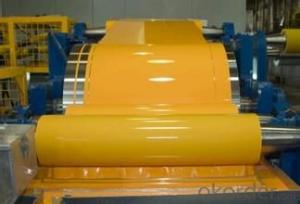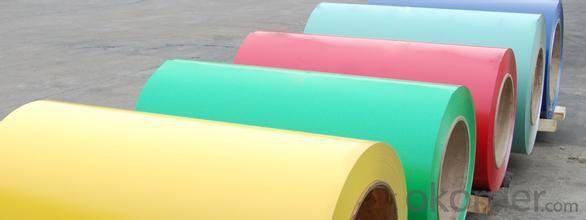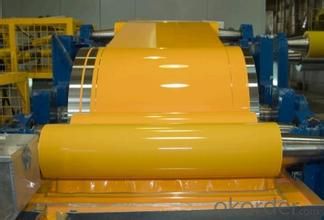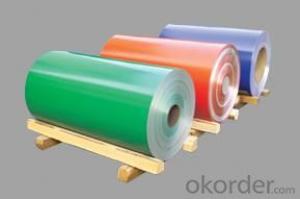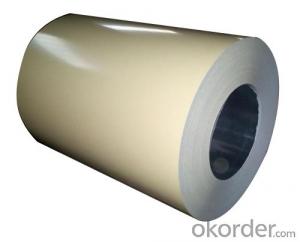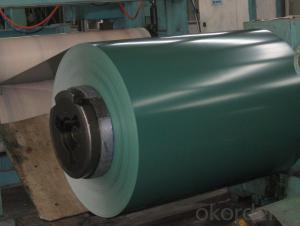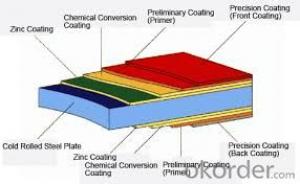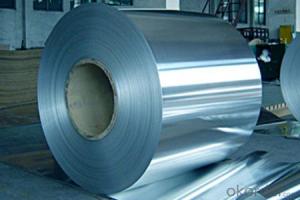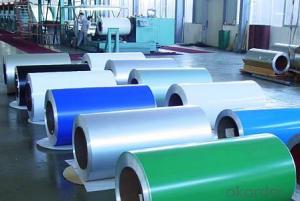Flat Rolled Aluminum Coil Illinois for Prepainted Aluminum Coil for Sandwich Panel
- Loading Port:
- China Main Port
- Payment Terms:
- TT OR LC
- Min Order Qty:
- -
- Supply Capability:
- -
OKorder Service Pledge
OKorder Financial Service
You Might Also Like
Aluminium is a relatively soft, durable, lightweight, ductileand malleablemetalwith appearance ranging from silvery to dull gray, depending on the surfaceroughness. It is nonmagnetic and does not easily ignite. A fresh film ofaluminium serves as a good reflector (approximately 92%) of visible lightand an excellent reflector (as much as 98%) of medium and far infraredradiation. The yield strength of pure aluminium is 7–11 MPa,while aluminium alloys have yield strengths ranging from200 MPa to 600 MPa. Aluminium has about one-third the densityand stiffness of steel. It is easily machined,cast, drawn and extruded.
Aluminium alloys (or aluminum alloys; see spellingdifferences) are alloysin which aluminium(Al) is the predominant metal. The typical alloying elements are copper, magnesium,manganese,silicon,tin and zinc. There are twoprincipal classifications, namely casting alloys and wrought alloys, both of which are furthersubdivided into the categories heat-treatableand non-heat-treatable. About 85% of aluminium is used for wrought products,for example rolled plate, foils and extrusions.Cast aluminium alloys yield cost-effective products due to the low meltingpoint, although they generally have lower tensile strengthsthan wrought alloys. The most important cast aluminium alloy system is Al–Si,where the high levels of silicon (4.0–13%) contribute to give good castingcharacteristics. Aluminium alloys are widely used in engineering structures andcomponents where light weight or corrosion resistance is required
Specification:
Alloy: AA1050, 1060, 1100,AA3003, 3005, 3015, 5052, 5754, 5083,8011, etc
Temper:H14/16/18/22/24/32, HO etc.
Thickness:0.2mm—100mm
Width: 100mm—2300mm (Can be slitted)
InnerDiameter: 508MM
Coil Weight:500kg-3000kg(Max.)
Application:Foil stock, Circles, Roofing, Can stock, Marine plate,Anti-slipery purpose in vehicles, packing and appliance.
Features:
1. Excellent quality of products
2. Quick delivery
3. Best service to clients
4. BV,SGS avalible
5. No buckle o waveness
6. Tension leveling
7. Certificate of Origin
8. Form A,E
Packaging Detail:
Carton ,Woodenpallet with plastic protection packing ,standard seaworthy packing or as yourrequest.
ProductionCapacity:
AnnualProduction capacity of 600,000 tons.
Products areexported to United States, Canada, U.A.E, Brazil, Mexico,Thailand, Vietnam,Nigeria etc, over 100 countries andregions all over the world.
Production Line:
CNBM aluminumproduction base is comprised of 18 aluminumannealers, 10 coil and foilmills, 4 continuous production lines, 2hot rolling production line and 3prepainted lines.
FAQ:
1. What is the form of payment?
Normally 30% TT, L/C
2. Type of quotation?
FOB, CFR, CIF
3. Port of loading?
Shanghai port
4. Delivery time?
30 day after client’s deposit
- Q: How are aluminum coils cleaned and maintained?
- Aluminum coils are typically cleaned and maintained by following a few key steps. Firstly, any loose debris or dirt should be removed using a soft brush or vacuum cleaner. Then, a mild detergent solution or a specialized coil cleaner can be applied to the coils, followed by gentle scrubbing with a soft brush to remove any stubborn dirt or grime. It is important to rinse off the cleaning solution thoroughly using a hose or pressure washer, ensuring no residue is left behind. Regular maintenance includes checking for any signs of damage or corrosion, and if required, applying a protective coating or lubricant to prevent future issues.
- Q: Are aluminum coils suitable for electrical conductivity?
- Indeed, aluminum coils prove to be suitable for electrical conductivity. With its conductivity rating at approximately 62% of the International Annealed Copper Standard (IACS), aluminum stands as a highly conductive material. Consequently, aluminum coils emerge as an exceptional choice for a variety of electrical applications, encompassing power transmission and distribution, electrical motors, and transformers. Furthermore, aluminum coils present a range of advantages, including their lightweight nature, high resistance to corrosion, and lower cost in comparison to copper coils. Nevertheless, it is crucial to acknowledge that aluminum exhibits a lower conductivity than copper, thus potentially necessitating larger aluminum coils to attain the same level of conductivity as smaller copper coils. In summary, aluminum coils remain a viable and frequently employed option for electrical conductivity.
- Q: What is the minimum thickness available for aluminum coils?
- The specific requirements of the application can cause variations in the minimum thickness available for aluminum coils. Typically, aluminum coils can have a minimum thickness of approximately 0.006 inches or 0.15 millimeters. It is crucial to consider that different industries or uses may impose distinct minimum thickness demands. Therefore, it is advisable to seek guidance from a manufacturer or supplier to ascertain the suitable thickness for a particular application.
- Q: Do you have an aluminum coil first? Is there an aluminum plate?
- The general process of aluminum plate production is: aluminium ingot - aluminum water - casting roll - aluminum roll ---- aluminum plate [Ji'nan excellent aluminum industry]. Welcome to visit.
- Q: What industries utilize aluminum coils?
- There are several industries that utilize aluminum coils for various purposes. One of the major industries that extensively uses aluminum coils is the construction industry. Aluminum coils are commonly used for roofing, siding, and gutter systems due to their lightweight nature, durability, and resistance to corrosion. Additionally, the transportation industry also relies heavily on aluminum coils for manufacturing automotive parts, such as radiators, condensers, and heat exchangers, as aluminum is known for its excellent heat transfer properties. The packaging industry also utilizes aluminum coils for producing cans and containers due to their ability to preserve the freshness and quality of food and beverages. Moreover, the electrical industry relies on aluminum coils for manufacturing transformers, electrical conductors, and wiring, as aluminum is a good conductor of electricity. Lastly, the aerospace industry uses aluminum coils for constructing aircraft parts, such as wings, fuselage, and structural components, as aluminum provides strength while keeping the weight of the aircraft low.
- Q: who invented aluminum and or aluminum foil?
- Well, God invented aluminum, as it is an ELEMENT. The other, I don't know.
- Q: What are the different sizes available for aluminum coils?
- Aluminum coils are available in various sizes to meet the diverse needs of different industries and applications. The sizes of aluminum coils can vary depending on factors such as the intended use, manufacturing process, and customer requirements. Generally, aluminum coils are available in a range of thicknesses, typically ranging from 0.2mm to 8mm. The width of aluminum coils can vary from as narrow as a few inches to more than 60 inches. The length of aluminum coils can be customized, but standard lengths are often around 1000mm to 6000mm. The specific sizes available for aluminum coils may also depend on the manufacturing capabilities of the supplier or manufacturer. Some suppliers may offer a wide variety of sizes to cater to different customer demands, while others may have a more limited range of sizes. It is important to note that the availability of specific sizes may also be subject to minimum order quantities or lead times. Therefore, it is advisable to consult with the supplier or manufacturer to inquire about the specific sizes available and any limitations or requirements that may apply. Overall, the different sizes available for aluminum coils provide flexibility for customers to choose the most suitable dimensions for their specific applications and requirements.
- Q: Can aluminum coils be used in high-pressure or high-temperature environments?
- High-pressure or high-temperature environments typically do not recommend the use of aluminum coils. Although aluminum is known for its high thermal conductivity and resistance to corrosion, it has limitations when exposed to extreme conditions. When it comes to high-pressure environments, aluminum coils may lack the necessary strength and durability required to withstand the forces exerted by pressurized systems. Aluminum has a lower tensile strength compared to metals like steel or titanium, making it more vulnerable to deformation or failure under high pressure. Therefore, it is generally advisable to use materials with higher strength and pressure ratings in such situations. Likewise, aluminum coils have a relatively low melting point compared to metals such as steel or copper. Aluminum's melting point is approximately 660 degrees Celsius (1220 degrees Fahrenheit), which makes it susceptible to damage or failure in high-temperature environments. For applications where the temperature exceeds the melting point of aluminum, it is recommended to use materials with higher temperature resistance. However, it is important to note that there are specialized alloys and coatings available that can enhance the high-temperature and high-pressure capabilities of aluminum. These modifications can improve its strength, heat resistance, and corrosion resistance, making it suitable for certain applications in extreme conditions. Nevertheless, it is crucial to carefully consider the specific requirements and limitations of the intended environment before deciding to use aluminum coils. Seeking advice from experts and considering alternative materials may be necessary to ensure the safety and efficiency of the system.
- Q: Can aluminum coils be used in heat exchangers?
- Yes, aluminum coils can be used in heat exchangers. Aluminum is commonly used in heat exchanger applications due to its excellent heat transfer properties, lightweight nature, corrosion resistance, and cost-effectiveness.
- Q: How are aluminum coils protected from corrosion?
- Aluminum coils are protected from corrosion through various methods and coatings. One common method is anodizing, which involves immersing the coils in an electrolyte solution and passing an electric current through them. This process forms a thick oxide layer on the surface of the aluminum, providing excellent corrosion resistance. Another method is the application of a protective coating. Aluminum coils can be coated with organic or inorganic coatings, such as polyester, epoxy, or polyvinylidene fluoride (PVDF). These coatings act as a barrier, preventing moisture and corrosive substances from reaching the aluminum surface. Additionally, aluminum coils can be protected through the use of sacrificial coatings. This involves applying a layer of a more reactive metal, such as zinc or magnesium, onto the aluminum surface. These sacrificial coatings corrode before the aluminum does, effectively protecting it from corrosive elements. Regular cleaning and maintenance also play a crucial role in preventing corrosion. Accumulated dirt, debris, and corrosive substances should be regularly removed from the surface of the coils to maintain their corrosion resistance. Overall, a combination of anodizing, protective coatings, sacrificial coatings, and proper maintenance ensures that aluminum coils are effectively protected from corrosion, extending their lifespan and maintaining their performance.
Send your message to us
Flat Rolled Aluminum Coil Illinois for Prepainted Aluminum Coil for Sandwich Panel
- Loading Port:
- China Main Port
- Payment Terms:
- TT OR LC
- Min Order Qty:
- -
- Supply Capability:
- -
OKorder Service Pledge
OKorder Financial Service
Similar products
Hot products
Hot Searches
Related keywords

